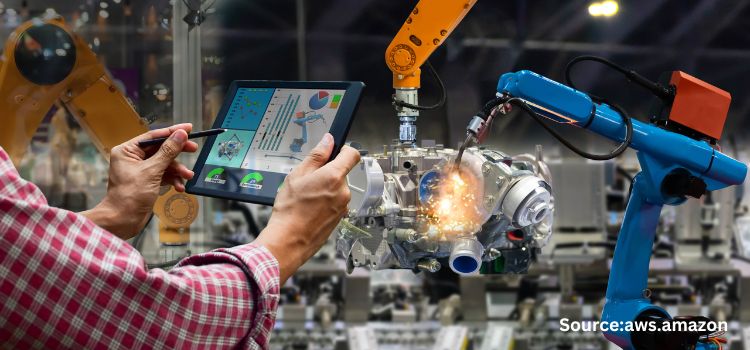
France Distributed Control System (DCS) Market by Component (Hardware, Software, and Services) Application (Batch and Continuous Process), by Project Type, (New Construction, Replacement, and Upgrade/Expansion), by End User (Oil & Gas, Chemicals & Refining, Energy & Power, Pulp & Paper, Metals & Mining, Pharmaceutical & Biotech, Food & Beverages, Cement & Glass, Water & Wastewater, and Others) - Opportunity Analysis and Industry Forecast 2024–2030
Industry: Semiconductor & Electronics | Publish Date: 04-Dec-2024 | No of Pages: 155 | No. of Tables: 118 | No. of Figures: 63 | Format: PDF | Report Code : SE936
Market Overview
France Distributed Control System (DCS) Market was valued at USD 695.77 million in 2023, and is predicted to reach USD 1180.7 million by 2030, with a CAGR of 7.7% from 2024 to 2030. A Distributed Control System (DCS) is a computer-based control system widely employed to oversee and automate industrial processes. It comprises a network of controllers distributed throughout industrial facilities, facilitating communication and coordination in the automation of various processes. DCS systems find applications across diverse industries, including but not limited to the chemical, petrochemical, pharmaceutical, food and beverage, and power generation sectors.
These systems are particularly valuable in large-scale industrial processes demanding a high level of automation and control, such as those in oil refineries, chemical plants, and power stations. They serve to regulate and oversee a range of operations, including drilling, refining, blending, manufacturing, filtration, and disinfection, ensuring processes run with precision, efficiency, and safety.
The utilization of DCS systems offers numerous advantages, including enhanced process control, heightened efficiency, and improved safety, along with reduced downtime. DCS achieves this by distributing control functions across multiple controllers, providing redundancy and fault tolerance. This means that even in the event of a controller failure, industrial processes can continue to operate without disruptions.
DCS systems have evolved into indispensable components of modern industrial automation setups, substantially enhancing the reliability and efficiency of industrial processes. Furthermore, they contribute to safety by enabling real-time control and process monitoring. They are capable of detecting potential safety hazards and promptly alerting operators to take corrective measures.
DCS systems are also instrumental in predictive maintenance, facilitating proactive maintenance practices that minimize downtime. They collect and analyse data from sensors, offering valuable insights for continuous process improvement.
Powering France: The Vital Role of DCS in Nuclear Energy Management
France has a large energy sector with a focus on nuclear energy as well as renewable energy sources such as wind and solar power. For decades, French power generation produced a relatively low level of carbon dioxide emissions compared with similar economies, owing to significant share of nuclear energy.
With large share of nuclear power in French power generation, DCS technology has become an essential tool for managing and monitoring operations of nuclear power plants. According to the International Energy Statistics, in 2021, nuclear power plants in France produced 361 billion kilowatt-hours of electricity, representing 68% of the country's total annual electricity production. This percentage is the highest in the world, in terms of nuclear power generation.
Elevating DCS Industry in France: Global Recognition and Certification Drive Expansion
The growth in product recognition and certification of DCS solutions at the global level, fostered by influential global players such as Schneider Electric is a significant factor that propels growth of the Distributed Control System (DCS) industry in France.
For instance, in February 2022, Schneider Electric introduced that its EcoStruxure Foxboro Distributed Control System (DCS) received certification for compliance with the globally recognized ISASecure System Security Assurance 4.0.0 Level 1 ISA/IEC 62443-3-3 cybersecurity standard, which is widely accepted within the industry.
This development is expected to increase the level of trust and confidence in the security & reliability of DCS system, particularly among industries that prioritize cybersecurity, such as oil & gas, chemical, and power generation. It is further expected to prevent cyber-attacks and data breaches, which are significant risks to industrial systems.
The Risk Associated with Cybercrimes Hampers the Market Growth in France.
DCS systems are inclined to cyberattacks as they are networked and computerized. Cybercriminals can gain unauthorized access to DCS systems, compromise sensitive data, and disrupt critical infrastructure, causing significant financial losses and reputational damage. The consequences of a successful cyber-attack on a DCS system can be severe, especially in industries such as power generation, oil & gas, and chemical processing, where disruptions can have significant environmental and public safety implications.
Modular and Flexible DCS Systems: Unlocking Opportunities for Enhanced Automation
The introduction of modular and flexible DCS systems can create ample growth opportunities for DCS market. Traditionally, DCS systems have been highly centralized and monolithic, with large-scale installations that are expensive and complex to install and maintain.
However, introduction of modular and flexible DCS systems is changing this paradigm. Modular systems are designed to be more flexible and scalable, with a modular architecture that allows easy integration with other systems and components. This makes it easier to customize DCS systems to meet specific needs of individual organizations, without the need for costly and time-consuming customization.
These systems can help to improve production efficiency, reduce costs, and enhance product quality, which is expected to propel demand for DCS systems across a range of industries, including manufacturing, energy, and process industries.
ABB’s modular-enabled process automation solution that combines an orchestration layer is one of the major examples of modular and flexible DCS system. It also consists of a module layer integrated with module type packages (MTPs) technology for cost-effective modularization. This solution is designed to provide end-users such as mining, pharmaceuticals, and biotech with an automation solution that can fit their applications better than Programmable Logic Controllers (PLCs) and costs less than a traditional DCS.
Competitive Landscape
The France distributed control system (DCS) industry includes several market players such as Yokogawa Electric Corporation, Hitachi Ltd., Omron Corporation, Emerson Electric Co., Mitsubishi Electric Corporation, ABB Ltd., Rockwell Automation Inc., Honeywell International Inc., Valmet OYJ, Toshiba Corporation, Schneider Electric SE, General Electrics, Ingeteam Corporation S.A, Azbil Corporation, and Siemens AG.
France Distributed Control System (DCS) Market Key Segments
By Component
-
Hardware
-
Controller
-
I/O
-
Workstation
-
Networking Hardware
-
-
Software
-
Service
-
Integration and Implementation
-
Managed Services
-
Support and Consultation
-
By Application
-
Batch
-
Continuous Process
By Project Type
-
New Construction
-
Replacement
-
Upgrade and Expansion
By End User Industry
-
Oil & Gas
-
Chemicals & Refining
-
Energy & Power
-
Pulp & Paper
-
Metals & Mining
-
Pharmaceutical & Biotech
-
Food & Beverages
-
Cement & Glass
-
Water & Wastewater
-
Others
Key Players
-
Yokogawa Electric Corporation
-
Hitachi Ltd.
-
Omron Corporation
-
Emerson Electric Co.
-
Mitsubishi Electric Corporation
-
ABB Ltd.
-
Rockwell Automation Inc.
-
Honeywell International Inc.
-
Valmet OYJ
-
Toshiba Corporation
-
Schneider Electric SE
-
General Electrics
-
Ingeteam Corporation S.A
-
Azbil Corporation
-
Siemens AG
REPORT SCOPE AND SEGMENTATION:
|
Parameters |
Details |
|
Market Size in 2023 |
USD 695.77 Million |
|
Revenue Forecast in 2030 |
USD 1180.7 Million |
|
Growth Rate |
CAGR of 7.7% from 2024 to 2030 |
|
Analysis Period |
2023–2030 |
|
Base Year Considered |
2023 |
|
Forecast Period |
2024–2030 |
|
Market Size Estimation |
Million (USD) |
|
Growth Factors |
Focus on nuclear energy and technological advancements. Increasing technological advancements. |
|
Companies Profiled |
15 |
|
Market Share |
Available for 10 companies |
|
Customization Scope |
Free customization (equivalent up to 80 working hours of analysts) after purchase. Addition or alteration to country, regional, and segment scope. |
|
Pricing and Purchase Options |
Avail customized purchase options to meet your exact research needs. |

















 Speak to Our Analyst
Speak to Our Analyst




















